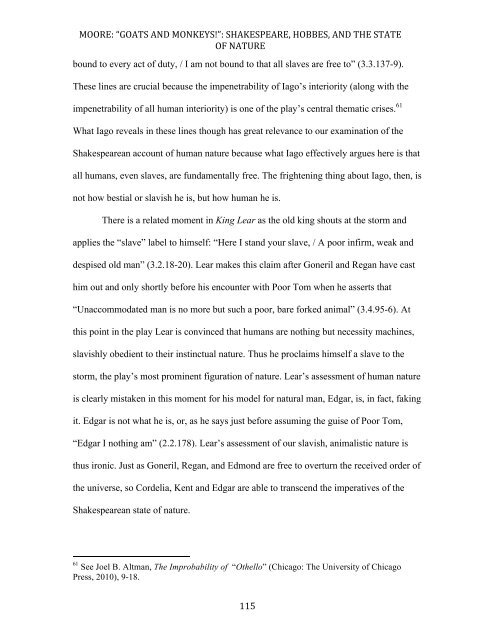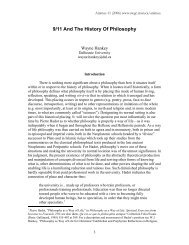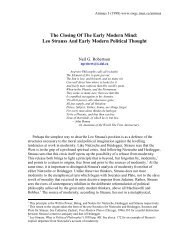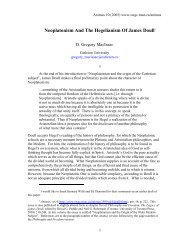âgoats and monkeys!â: shakespeare, hobbes, and the state of nature
âgoats and monkeys!â: shakespeare, hobbes, and the state of nature
âgoats and monkeys!â: shakespeare, hobbes, and the state of nature
Create successful ePaper yourself
Turn your PDF publications into a flip-book with our unique Google optimized e-Paper software.
MOORE: “GOATS AND MONKEYS!”: SHAKESPEARE, HOBBES, AND THE STATE <br />
OF NATURE <br />
bound to every act <strong>of</strong> duty, / I am not bound to that all slaves are free to” (3.3.137-9).<br />
These lines are crucial because <strong>the</strong> impenetrability <strong>of</strong> Iago’s interiority (along with <strong>the</strong><br />
impenetrability <strong>of</strong> all human interiority) is one <strong>of</strong> <strong>the</strong> play’s central <strong>the</strong>matic crises. 61<br />
What Iago reveals in <strong>the</strong>se lines though has great relevance to our examination <strong>of</strong> <strong>the</strong><br />
Shakespearean account <strong>of</strong> human <strong>nature</strong> because what Iago effectively argues here is that<br />
all humans, even slaves, are fundamentally free. The frightening thing about Iago, <strong>the</strong>n, is<br />
not how bestial or slavish he is, but how human he is.<br />
There is a related moment in King Lear as <strong>the</strong> old king shouts at <strong>the</strong> storm <strong>and</strong><br />
applies <strong>the</strong> “slave” label to himself: “Here I st<strong>and</strong> your slave, / A poor infirm, weak <strong>and</strong><br />
despised old man” (3.2.18-20). Lear makes this claim after Goneril <strong>and</strong> Regan have cast<br />
him out <strong>and</strong> only shortly before his encounter with Poor Tom when he asserts that<br />
“Unaccommodated man is no more but such a poor, bare forked animal” (3.4.95-6). At<br />
this point in <strong>the</strong> play Lear is convinced that humans are nothing but necessity machines,<br />
slavishly obedient to <strong>the</strong>ir instinctual <strong>nature</strong>. Thus he proclaims himself a slave to <strong>the</strong><br />
storm, <strong>the</strong> play’s most prominent figuration <strong>of</strong> <strong>nature</strong>. Lear’s assessment <strong>of</strong> human <strong>nature</strong><br />
is clearly mistaken in this moment for his model for natural man, Edgar, is, in fact, faking<br />
it. Edgar is not what he is, or, as he says just before assuming <strong>the</strong> guise <strong>of</strong> Poor Tom,<br />
“Edgar I nothing am” (2.2.178). Lear’s assessment <strong>of</strong> our slavish, animalistic <strong>nature</strong> is<br />
thus ironic. Just as Goneril, Regan, <strong>and</strong> Edmond are free to overturn <strong>the</strong> received order <strong>of</strong><br />
<strong>the</strong> universe, so Cordelia, Kent <strong>and</strong> Edgar are able to transcend <strong>the</strong> imperatives <strong>of</strong> <strong>the</strong><br />
Shakespearean <strong>state</strong> <strong>of</strong> <strong>nature</strong>.<br />
61 See Joel B. Altman, The Improbability <strong>of</strong> “O<strong>the</strong>llo” (Chicago: The University <strong>of</strong> Chicago<br />
Press, 2010), 9-18.<br />
115
















